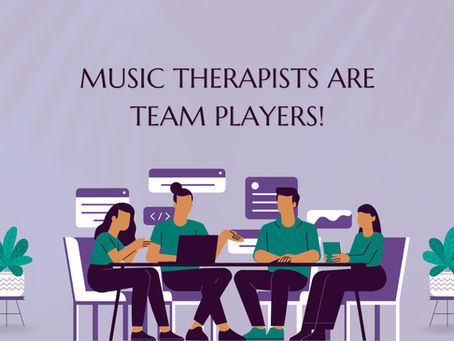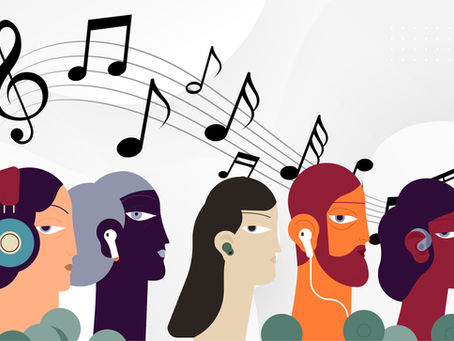top of page
Search


Music Therapy at End-of-Life: A Curative Role in Palliative Care
During my senior year as a music therapy undergraduate student, I had the opportunity to live and volunteer at a Hospice home for those who had a prognosis of 3 months or less to live and did not have a stable living situation. While I was not yet a practicing music therapist, the experiences I had there shaped my understanding of the particular power of music and prevalence of spiritual care in this population. Hospice/End-of-life care is palliative in a physical sen

Emily Heck, MT-BC
4 days ago3 min read


Considering Cultural Values in Latinx Communities to Support Therapeutic Alliance
Bad Bunny’s historic halftime show celebrated many aspects of Puerto Rican culture. As music therapists, it is important to understand cultural values and their impact on our clinical approaches to best support the therapeutic alliance with both the client and the client’s family. In Melisa de León’s article “Mexican American Values and Therapeutic Alliance in Music Therapy: Composite Vignettes from the Rio Grande Valley”, she accounts her personal experience as

Abby Metcalf, MM, MT-BC
Feb 163 min read


Tips for the CBMT Board Certification Exam
Passing the Music Therapist–Board Certified (MT-BC) exam is a milestone many of us dream about from the very first music therapy class. It represents years of coursework, clinical hours, supervision, self-reflection, and growth. Not just as a student, but as a therapist. If you’re preparing to sit for the CBMT Board Certification Exam, take a deep breath. You are closer than you think. Understanding the Exam Itself To earn the MT-BC credential, candidates must pass the CBMT b

Molly Vielhauer, MT-BC
Jan 265 min read


The Ethos of Valuing Music
How do we as music therapists and listeners value music in our lives and practices? I wrestled with this question on a recent trip to Denver. I saw an instrumental metal band performing on the sidewalk of Broadway using a gas generator to power their amps. The band was taking donations via a sign that read “gas money”. The band attracted a small crowd of enthusiastic listeners, and eventually the generator shut off mid-performance. It was a jarring and comical experience and

David St Charles, MT-BC
Dec 15, 20253 min read


Honoring December Celebrations
With Thanksgiving in our rearview mirror, now is the time we look ahead to the rest of the holiday season. December is a busy month full of opportunities to celebrate. In this post, we will dive a bit deeper into three of the major holidays that will be observed this month, along with some songs you can incorporate into music therapy sessions to honor each of them! Hanukkah: Evening of December 14-December 22, 2025 Origins Coming up first this month is Hanukkah, a Jewish ho

Emily Dobson, MT-BC
Dec 8, 20254 min read


Some useful tunes, and the power of TENTHS!
Here are some tunes that have been useful to me in sessions, maybe you know them already but if not, these are good’uns! “I Don’t Want to Live on the Moon” written in 1978 by Jeff Moss and performed on Sesame Street by Ernie (Jim Henson). This song was re-introduced to me by Erin Frees, MT-BC when I was interning at Children’s Minnesota. She utilized it as a lullaby to help encourage rest. I say re-introduced because I remember playing it once or twice at random gigs with lo

Andy Schuster, MT-BC
Nov 24, 20254 min read


Attitude of Gratitude?
Music therapists often incorporate music-based interventions that reflect the current seasons. As the calendar turns to November, I often find myself struggling to integrate the concept of gratitude into sessions. On one hand, practicing gratitude has been shown to positively impact health and wellbeing by improving sleep, mood, and immunity; and has also been shown to decrease depression, anxiety and chronic pain (American Heart Association, 2023). On the other hand, clients

Kristi McNellis, MT-BC
Nov 17, 20252 min read


Music Therapists as Team Players on a Multidisciplinary Team
One thing that I have always loved about being a music therapist is the way I get to blend many of my skills together. I am a musician. I blend both technique and precision with self-expression and creativity. I am flexible, adaptable and often play in collaboration with others (hello orchestra people!) I am a therapist. I care for people, and can understand their needs through assessment. I can listen, engage, guide and support. I am an allied health professional. I work i

Carolyn Beck, MT-BC
Nov 10, 20252 min read


Adaptive Instruments pt. 2
In music therapy, accessibility is essential. Every client should have the opportunity to participate in music-making, regardless of physical, sensory, or cognitive ability. Adaptive instruments make that possible. These tools and modifications expand how clients can engage in musical experiences, supporting clinical goals through active participation. What Are Adaptive Instruments? Adaptive instruments are musical tools designed or modified to meet individual needs. They all

McKenna Selissen, MT-BC
Nov 3, 20252 min read


Using Primary Instruments in Music Therapy
As music therapists, we are trained on guitar, piano, voice, and percussion. But many music therapists spend years cultivating a personal relationship to music by learning a different instrument long before pursuing a career in the field. Yet, many MT-BCs don’t use their primary instrument in clinical settings. Music therapy interventions can be effectively facilitated on an instrument outside of those taught in music therapy curriculum. For instance, hearing a new sound ca

Abby Metcalf, MM, MT-BC
Oct 20, 20252 min read


Adaptive Instruments in Music Therapy
In our work as music therapists, we interact with individuals of all ages and abilities. It is important to consider the different ways...

Jess Neppl, MT-BC
Oct 13, 20252 min read


Music and Nature? Perspectives of Music Therapists
Have you ever considered integrating nature into your music therapy practice? A recent study published in The Arts in Psychotherapy found...

Kristi McNellis, MT-BC
Sep 29, 20252 min read


Tips for Facilitating Guided Relaxation
When people hear that I am a music therapist, they often jump to the conclusion that my job entails playing sedative, atmospheric music...

Emily Dobson, MT-BC
Sep 22, 20253 min read


The Neuroscience of Music: A Review of the Basics
As music therapists, we know that music engages the brain in powerful ways. Whether we are working toward emotional regulation, motor...

Katie Kottemann, MT-BC
Sep 15, 20253 min read


Do you believe in music? Pt 2
These thoughts are inspired by Kayla Shafer’s post from July, in which she argued that what determines the success of a music therapy session is less about the therapist’s choices than one might expect–that in fact, an important element is the client’s belief in music as a therapeutic medium. This idea had not occurred to me, but immediately felt true, and I’ve been thinking ever since about the nature of that belief: what does it mean to believe in the music, and what can t

Joseph Neidorf, MT-BC
Sep 8, 20253 min read


What it means to be an MT-BC
What is Music Therapy? According to the American Music Therapy Association (AMTA) Music Therapy is defined as “the clinical &...

Molly Vielhauer, MT-BC
Jul 28, 20252 min read


Licensing Music Therapists in Minnesota: What's Happening Now?
Currently, 13 states across the United States require music therapists to maintain a professional license to practice, and Minnesota has...

Katie Kottemann, MT-BC
Jun 16, 20253 min read



Carolyn Beck, MT-BC
Jul 15, 20210 min read
bottom of page
